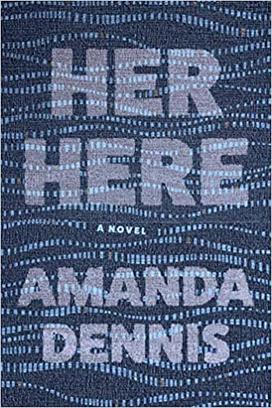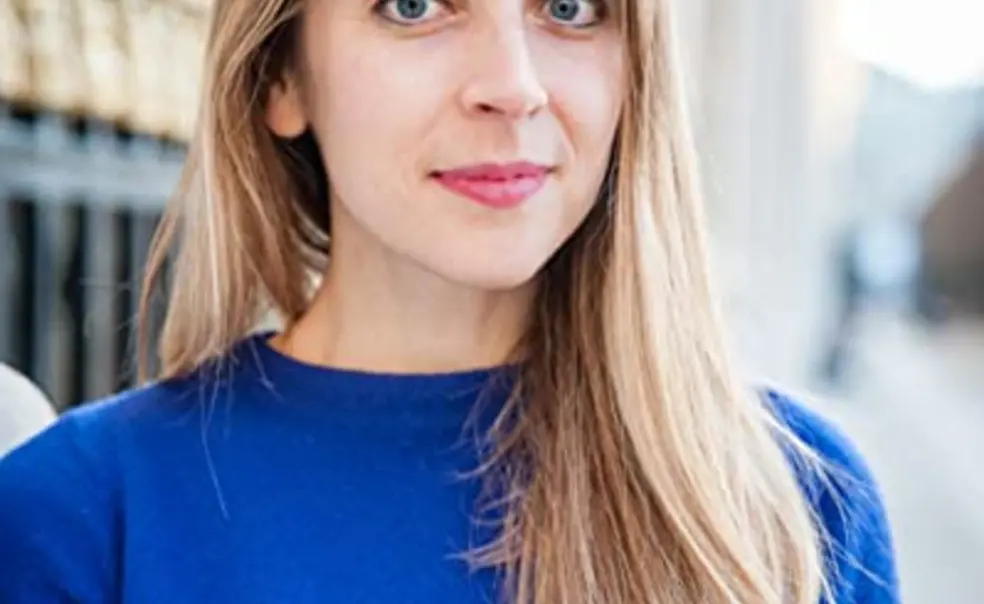Amanda Dennis ’03 debut novel, Her Here, Tells an Existential Detective Story
The book: In Her Here, Elena drops out of graduate school and ends her long-term romantic relationship to begin an investigation in finding Ella, a young woman who went missing six years prior in Thailand. Bringing her own trauma into the mix, Elena loses herself in Ella’s old journals, methodically retracing her steps, and starts to question her own identity. Elena’s quest to find answers and Ella brings her to her breaking point in this existential detective story.

The author: Born in Philadelphia, Amanda Dennis is a Cambridge Gates Scholar who studied modern languages at Princeton and Cambridge Universities before earning her Ph.D. from the University of California, Berkeley and her MFA from the Iowa Writers’ Workshop, where she was awarded a Whited Fellowship in creative writing. An avid traveler, she has lived in six countries, including Thailand, where she spent a year as a Princeton in Asia fellow. She has written about literature for the Los Angeles Review of Books and Guernica, and she is assistant professor of comparative literature and creative writing at the American University of Paris, where she is researching the influence of 20th-century French philosophy on the work of Samuel Beckett. Her Here is her first novel.
Opening lines: I have been up all night and now the day is gray, the narrow streets slick and silvered outside the taxi window. Sleeplessness gives the city an unreal, varnished air—shops, shutters, pigeons, and trees all flickering and chromed, like movie stills cut together in the old way.
The driver stops alongside stone steps that lead uphill. He tells me again that the street I am looking for does not exist. On the ride from the airport, he spoke of his childhood in Montmartre, of parties in squares strung with lights, where children were allowed to stay up dancing. As he spoke, he looked into the rearview mirror, his gaze warm, soliciting. Sometimes I give the impression of not paying attention, but I’m gleaning all I can from the present, encoding it carefully. It is unlikely that this man, who has lived here all his life, does not know my street. Perhaps he is right. None of it is real: Siobhán, the flat, the missing girl.
I find the place Marcel-Aymé on my GPS and show the driver. His bright laugh fills the car. He swivels into reverse. Maybe I was mispronouncing the name.
On the square, which exists, my eyes travel up the building façade, balcony after balcony, to a dome with a topmost window, which will be mine. Through sheets of cloud, sun strikes the wet brick and stone. Looking up like that gives me vertigo. By the door, which faces the square, a tree sways under its burden of pink, excessive blooms.
At the square’s far end, people are gathered. They are looking at something hidden from my view by their windbreakers and backpacks. When the group drifts away, I approach, leaving my suitcase by the door.
The statue is of a man stuck in the wall—or emerging. I can’t tell. His face of dark bronze is resigned. His fingers, long and expressive, reach toward me out of the stones, rubbed gold by many eager, living hands. As I move to touch the fingers, a high, shrill voice stops me.
—Isa!
A woman from the tourist group is gazing at me from the street.
—Isa! she says again, and runs down the slope that joins the street to the square.
Embarrassed, I stand still, my legs taking root among the stones. My face is one people think they know, and strangers will often tell me I remind them of someone. When she sees me up close, this woman, too, will find some detail in my face to set her right. She’ll apologize, ashamed of her error, but aglow with the memory of whomever she took me for.
Now she runs across the square, her black hair loose behind her, her low heels unsteady on the cobblestones. She reaches me, breathless, and takes my hands, pressing them to her chest. Her forehead is broad, and her eyes are black and wet with tears.
—Isabelle, she says.
Her smile makes me want to smile, too.
—No, I say.
She steps back and studies me, probing my gaze for recognition.
—But Isabelle, it’s you. Of course it’s you.
She laughs again, but more sadly this time, performing a calculation.
—If it was you, you wouldn’t tell me, she says, squeezing my hands.
Her touch is warm, her skin a little dry.
—No, I’m not her. I’m not Isa. My name is Elena. I’m sorry.
I am sorry. I’ve hurt her without meaning to. To appease her, I ask:
—When did you know Isa? Isabelle?
The ground of stones swells up like the sea, and the woman looks at me with such confusion that I turn away, embarrassed, and move quickly with my suitcase into the building.
Leaning against a wall of mirror in the foyer, I watch her retreat across the square. A scene like this shouldn’t bother me so much, but the world is strange today. I’ve been awake all night, crossing the ocean, and now I can’t shake her look of need. I’m not Isa, but the time I’ve lived and don’t remember deprives me of certainties. I’m sick of grasping, still, for the strong, solid shore where life can begin.
I imagine myself arriving at Ella’s door—or finding her on a beach or in a square—and saying, Ella, Ella! Do you know how long your mother—your real mother—has been looking for you? I’ll bring them together, mother and daughter. I can do nothing for the woman outside, but I can help Siobhán. I believe that Ella is alive and can be found.
I carry my suitcase up seven flights to the at that is to be mine. My mother was British, and, though my accent is American, she has left me with certain words, ways of saying. Taking the key from under the carpet, I twist it in the lock until the door opens onto a studio with high ceilings and parquet doors, dormer windows and false balconies, balustrades beyond which the city flickers under exchanges of sun and cloud. I find Ella’s journals immediately, on a table by the entrance, stacked under a Post-it with my name on it. Six books, all with hard canvas backings and each a different color. They seem both childish and prematurely ancient. I open one. Beige cover. Sharp scent of its paper is full of elsewhere. The handwriting is neat, round letters anchored to the lines of every page. Some entries are a paragraph, others much longer. I turn to a page at random and begin to read:
A Lanna house has no borders. Walls are doors, open to breezes blown across rice fields, orange orchards, and tea plantations. Jasmine is everywhere, on the highway with its trucks and motorcycles and at the roadside pineapple stands and noodle shops. I first noticed it on the tarmac of the tiny airport—its sweet, heavy scent.
It’s ridiculous to feel this frisson and hint of smell from words alone. A thought flies up, made of sounds: I’d rather be her than here. It doesn’t make sense. Ella could be dead. Maybe Siobhán is deluded to think she can be found. No. Siobhán is strange—secretive and intense—but not deluded. And she has lost a daughter—twice. Once given up, once taken away by the world.
Flipping through the pages, I feel embarrassed, catching phrases not meant for my eyes.
Her is Ella. She is so alive in her journals, the way I want to be. Looking for her feels urgent, a task with clear edges, purpose. She is someone I might love.
Here is a room with wide windows, a metallic sky rising like a dome over rooftops and monuments. Far below, in a park, branches are bone white under veils of leaves. Nothing moves, and it is cold for early summer. The clean white emptiness of the studio at makes me think of Irigaray, that feminist philosopher of watery things, who thought women use pronouns differently than men, who cast herself as the marine lover of Nietzsche, and who—a professor once told me this—lived in a white apartment, wore only white, and would not let others touch her. This is what I see. Others might say what a nice flat this is.
Here is also the city I left a month ago. Returning to it now—audaciously, as if the place were a sort of home—I feel its foreignness more acutely. The language still trips my tongue, and I don’t know this part of town. I was probably wrong to return.
Today is the sixteenth of June. The date is significant because Ella began the journals on the same day eight years ago. Siobhán must know this, working carefully as she does.
When Ella disappeared more than six years ago, her adoptive parents conducted a search in Thailand. The detective failed to turn up anything—only a few interviews (inconclusive) in the village where she lived. Even so, I’d rather be him, too, tracking Ella through jungles. All I have are her words, their rhythms—bodiless and abandoned.
Closing the beige book, I slip out the journal at the bottom of the stack. Green cover. The pages are stiffer, marked by rings of salt and warped by sea air. Her handwriting has changed, black threads of sentences unfurling over ruled paper.
I have glimpses into what is real. Can’t sustain them. Thresholds vanish as I try to enter. The world I’m writing is already gone.
I flip back, looking for context. A guesthouse in the hills near Chiang Rai. Teakwood gives the room its odor, rich and sharp. A breeze touches my face and arms—her face and arms, which, as I read, are mine. Someone is packing, suitcase on the bed. His back is turned, and his white shirt stands out against polished wood walls. Behind him, through wall-size doors, hills stretch into Myanmar.
Reading on, I see the brown track of the river, layered green hills going forever. Then a sun flash through the window returns me to myself and to here, to this white room in Paris.
Review: “In Her Here, Dennis has written a metaphysical investigation that is also a wonderfully personal account of a daughter coming to terms with the loss of her mother, and a mother coming to terms with the loss of her daughter. As Elena conjures Ella’s last days, the richly imagined narrative moves back and forth between Paris and Thailand, carrying both characters and readers to a vivid and suspenseful conclusion.”
—Margot Livesey, author of The Flight of Gemma Hardy and The Boy in the Fiel
Excerpt from Her Here. Copyright © 2021 by Amanda Dennis. Published by Bellevue Literary Press: www.blpress.org. Reprinted by permission of the publisher. All rights reserved.












No responses yet